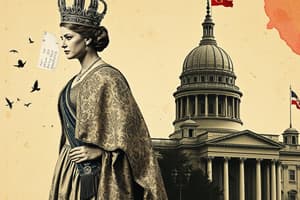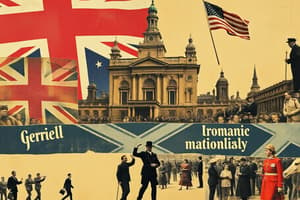Podcast
Questions and Answers
How do constitutional monarchies differ from absolute monarchies?
How do constitutional monarchies differ from absolute monarchies?
Constitutional monarchies differ from absolute monarchies in that they are bound to exercise powers and authorities within limits prescribed by an established legal framework.
Name three countries where the constitution grants substantial discretionary powers to the sovereign.
Name three countries where the constitution grants substantial discretionary powers to the sovereign.
Liechtenstein, Monaco, and Morocco
What is a constitutional monarchy?
What is a constitutional monarchy?
A constitutional monarchy is a form of monarchy in which the monarch exercises their authority in accordance with a constitution and is not alone in making decisions.
Name three countries where the monarch retains significantly less, if any, personal discretion in the exercise of their authority.
Name three countries where the monarch retains significantly less, if any, personal discretion in the exercise of their authority.
What is the main distinction between constitutional monarchies and absolute monarchies?
What is the main distinction between constitutional monarchies and absolute monarchies?
What is the Supreme Court of India?
What is the Supreme Court of India?
Who does the Supreme Court consist of?
Who does the Supreme Court consist of?
What powers does the Supreme Court have?
What powers does the Supreme Court have?
What types of cases does the Supreme Court of India hear?
What types of cases does the Supreme Court of India hear?
What is the role of the Supreme Court in safeguarding fundamental rights?
What is the role of the Supreme Court in safeguarding fundamental rights?
Flashcards are hidden until you start studying
Study Notes
Constitutional Monarchy
- A form of monarchy where the monarch exercises authority in accordance with a constitution and is not the sole decision-maker.
- Differs from absolute monarchies, where the monarch is the only decision-maker.
- Examples of constitutional monarchies include:
- Liechtenstein, Monaco, Morocco, Jordan, Kuwait, Bahrain, and Bhutan, where the constitution grants significant discretionary powers to the sovereign.
- The United Kingdom, other Commonwealth realms, the Netherlands, Spain, Belgium, Norway, Sweden, Lesotho, Malaysia, Thailand, Cambodia, and Japan, where the monarch retains limited or no personal discretion.
The Supreme Court of India
- The supreme judicial authority and highest court of the Republic of India.
- Final court of appeal for all civil and criminal cases in India.
- Has the power of judicial review.
- Consists of the Chief Justice of India and a maximum of 33 fellow judges.
- Has extensive powers in the form of:
- Original jurisdiction
- Appellate jurisdiction
- Advisory jurisdiction
- Takes up appeals primarily against verdicts of High Courts of various states and tribunals.
- Hears matters referred by the President of India as an advisory court.
- Invalidates laws and constitutional amendments that violate the Basic structure doctrine through judicial review.
- Safeguards the fundamental rights of citizens and settles legal disputes among the central government and state governments.
Studying That Suits You
Use AI to generate personalized quizzes and flashcards to suit your learning preferences.




